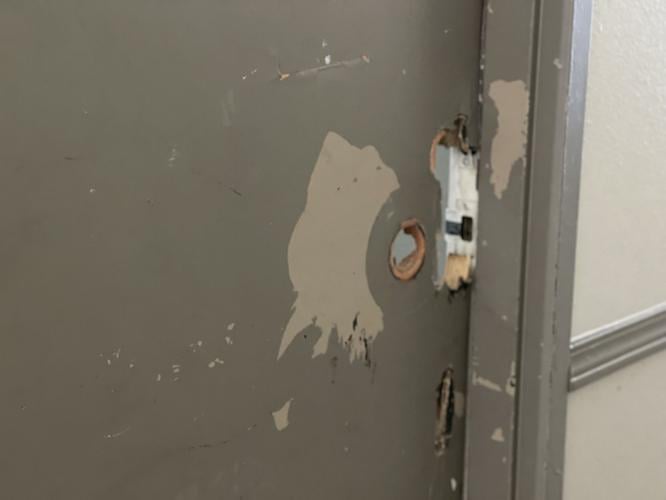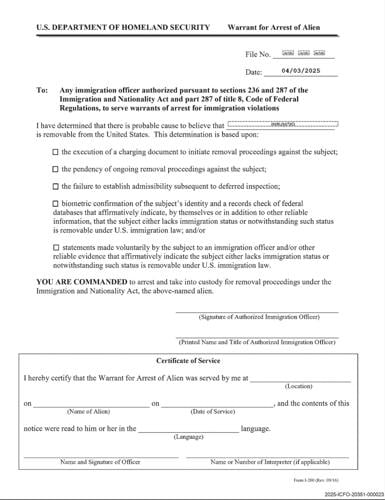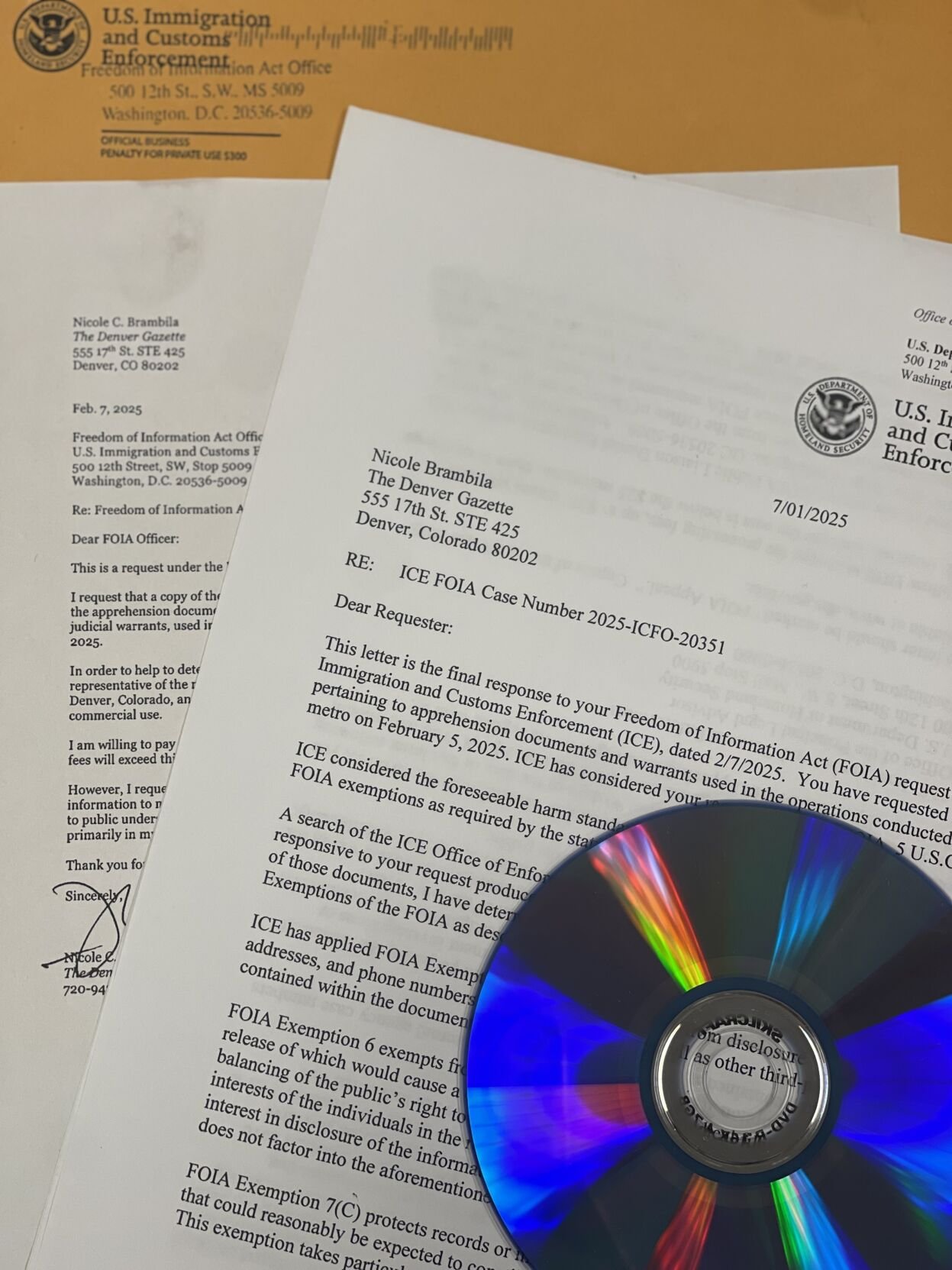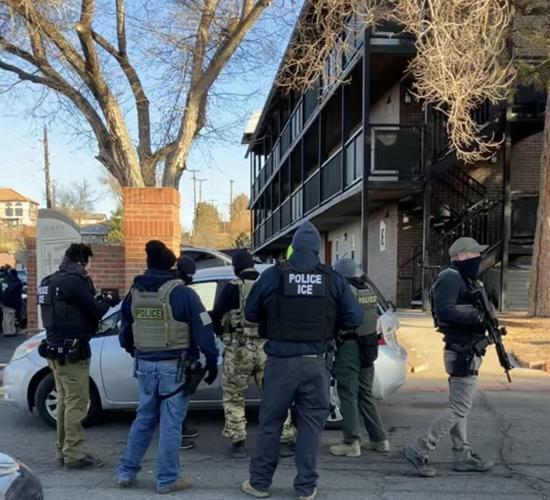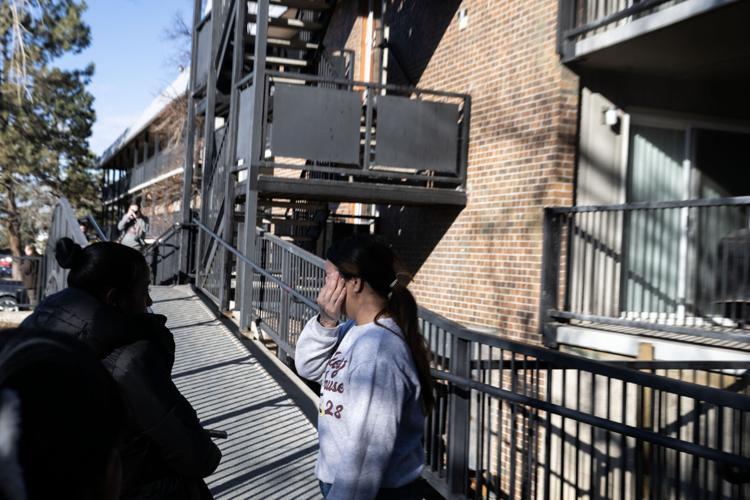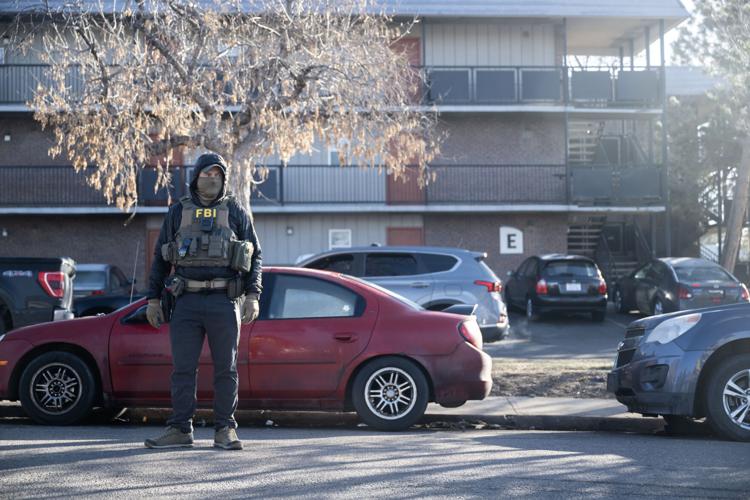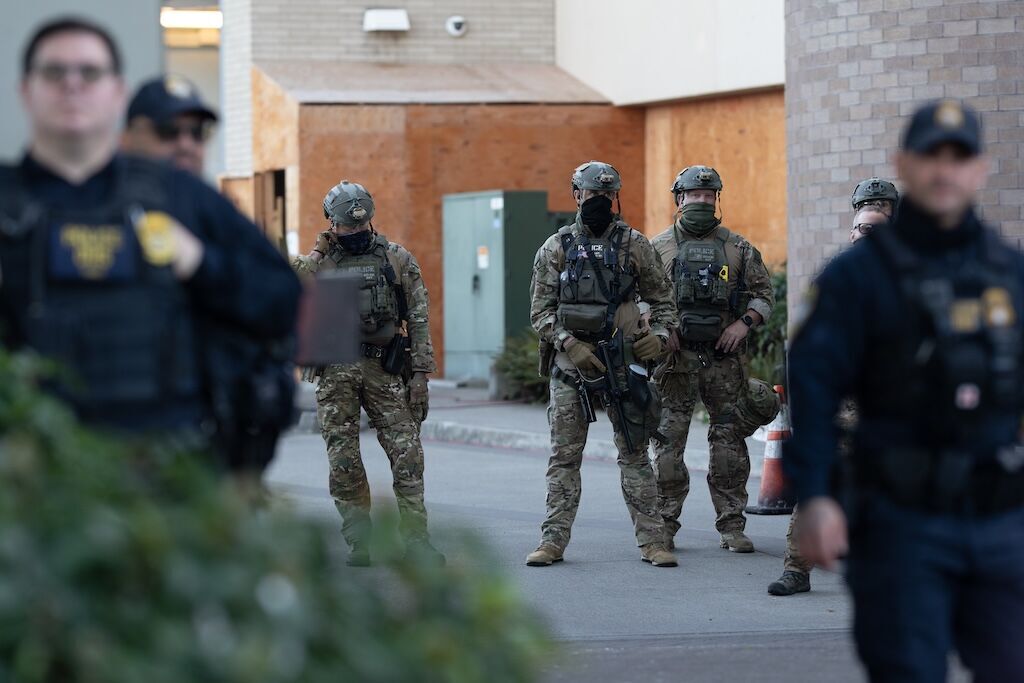DEA, ICE raid raises legal questions
The battering ram that tore through the Denver apartment door of Felicia Gurule’s family friend, “Pops,” left more than a mangled lock and splintered wood. It triggered questions in some quarters about constitutional boundaries of immigration raids — as well as defense by others of the federal crackdown.
Early that morning, federal agents shouted outside unit 301A, “DEA! Open the door!” Before anyone inside could respond, agents breached the door and tossed in a flashbang.
Officials with the Rocky Mountain Field Division of the U.S. Drug Enforcement Administration (DEA) have claimed they executed search warrants on Feb. 5 at the Cedar Run Apartments in south Denver, looking for “wanted drug traffickers.”
Federal agents from a joint operation that included DEA, the U.S. Immigration and Customs Enforcement (ICE) and the Federal Bureau of Investigation (FBI) appeared to have largely carried out the Feb. 5 raid with limited judicial oversight, according to data reviewed by The Denver Gazette.
Not everyone views ICE’s actions as problematic.
Aurora City Councilwoman Danielle Jurinsky said she was aware of at least one person detained and later released on bond by ICE at Whispering Pines, one of three troubled apartment complexes owned by CBZ Management, which nabbed headlines last year over the activities of a Venezuelan gang that gained a foothold in metro Denver.

A door to an apartment in Cedar Run Apartments shows signs of damage after federal authorities rammed it open during an immigration raid on Wednesday, Feb. 5, 2025 in Denver, Colo.
Jurinsky said she doesn’t believe federal agents have acted inappropriately.
“If they are doing things without judicial oversight, that would be concerning to me,” Jurinsky said. “I have to trust that they are; that they are doing things the right way.”
Federation for American Immigration Reform, or FAIR, noted ICE can lawfully enter if given consent or under other legal authorities, including criminal warrants, administrative code inspections or exigent circumstances.
“I would be shocked if ICE were attempting to forcibly enter private residences on an administrative warrant,” Matthew O’Brien, FAIR deputy executive director said in an email to The Denver Gazette.

Fernando Martinez and his girlfriend were awakened at a family friend’s house by a battering ram and a flashbang when Rocky Mountain DEA agents stormed their unit at Cedar Run Apartments on Feb. 5, 2025.
Based in Washington D.C., the organization says it seeks to “restore common sense border controls” and reduce overall immigration levels to roughly 300,000 a year. Without knowing the particulars of the entries made in Denver, it is impossible to assess their constitutionality,” O’Brien said. “When it comes to search and seizure issues, the devil is in the details.”
He added: “And there seems to be a significant amount of commentary being made about actions taken by ICE where the commentators don’t have sufficient information to advance the claims they are making.”
A question of warrants
The Feb. 5 raids unfolded more than 600 miles north of the border with Mexico in a city that, until recently, had largely avoided becoming a flashpoint in the national immigration debate.
That changed in December 2022, when Denver began receiving waves of immigrants who had illegally crossed America’s southern borders.
Since then, more than 40,000 have come to the Mile High City, with roughly half staying, according to tickets for travel to leave Colorado.
That influx preceded the Trump administration’s stepped-up immigration enforcement, including the Feb. 5 raids.
That day, ICE relied on 27 administrative warrants, according to documents obtained under the Freedom of Information Act, or FOIA.
DEA agents executed two judicial search warrants, according to Steffan Tubbs, a spokesperson for the DEA’s Rocky Mountain Field Division. The DEA has ignored a FOIA request for the search warrant. And the agency has yet to produce those warrants in response to a FOIA request.
The FBI declined to say whether the agency had obtained any warrants.
Some residents at Cedar Run Apartments were awoken to battering rams and flash bangs as federal agents with multiple agencies began raids.
{
“@context”: “https://schema.org”,
“@type”: “VideoObject”,
“name”: “ICE begins raids around metro Denver”,
“description”: “Some residents at Cedar Run Apartments were awoken to battering rams and flash bangs as federal agents with multiple agencies began raids.”,
“thumbnailUrl”: “https://bloximages.newyork1.vip.townnews.com/denvergazette.com/content/tncms/assets/v3/editorial/b/9d/b9d4cdfb-20dc-5415-9d5b-fb2e37100181/689659aa94b86.preview.png”,
“uploadDate”: “2025-02-05T16:40:00-07:00”,
“contentUrl”: “https://cdn.field59.com/GAZETTE/056298ca6bef7ab7b62c23dc68e4937a7052720a_fl9-360p.mp4”
}
To date, none of the judicial warrants have been made public or provided to The Denver Gazette.
Everyone in unit 301A that day disputed the DEA’s statement that agents used a judicial warrant to enter residents’ homes.
“They didn’t show nothing,” Fernando Martinez had said. “They just let themselves in.”
Tubbs did not respond to questions about why Cedar Run residents said they were not shown or provided a copy of the warrant at the time of the raid — a step typically required under federal rules.
Several apartment doors at Cedar Run on Feb. 5 showed visible signs of forced entry — more than the two DEA judicial warrants would appear to cover — including broken frames and missing locks.
Several questions remained unanswered. For example, did ICE operate under the DEA — or the FBI’s — judicial warrants?
Sources said it’s not unusual for ICE to do so, as immigration agents themselves do not breach doors.
What were the circumstances that led to the forced entry, assuming officers also broke down other doors, beyond the two units covered by the DEA warrants?
Located in southeast Denver, Cedar Run is a 384-unit complex built in 1970 that offers one-and two-bedroom apartments near Cherry Creek. The complex is owned by Gelt Venture Partners, which purchased the property in 2019.
Immigration lawyer: ‘An administrative warrant is not a warrant’
Individuals are protected from unreasonable searches and seizures under the Fourth Amendment. Supported by an oath, warrants are supposed to describe the place to be searched as well as the persons or things seized.
The Fourth Amendment protects everyone — regardless of citizenship — from unreasonable search and seizures.
This safeguard means law enforcement may not enter private homes without a warrant signed by a judge, which requires probable cause.
Many often argue that administrative warrants — an internal document frequently used by immigration authorities — do not carry the same force of law as one signed by a judge. That is, an administrative warrant authorizes agents to make an arrest; it does not authorize forced entry without consent.
Individuals may deny an officer entry and refuse to comply with an administrative warrant, immigration attorneys, for example, say.
In the days following the Feb. 5 raid, The Denver Gazette submitted FOIA requests to ICE, DEA and the FBI seeking copies of the warrants used to justify the forced entry into private residences.
Under FOIA, federal agencies have 20 business days to respond. Even with extensions, responses were expected in March.
DEA officials never acknowledged the FOIA, despite U.S. postal tracking showing the written request was received by the agency.
The FBI denied the FOIA request, saying it was “too vague.” (The Denver Gazette has since submitted additional FOIA requests to the DEA and FBI.)
Only ICE responded with public records — five months later.

FILE PHOTO: Protesters hold signs and chant slogans across the street from Cedar Run Apartments in Denver as Drug Enforcement Agency agents execute a warrant on Wednesday, Feb. 5, 2025. (Stephen Swofford, Denver Gazette)
The responsive records show ICE agents relied on administrative warrants, not judicial warrants.
“An administrative warrant is not a warrant,” said Hans Meyer, a Denver immigration attorney. “It doesn’t give them the authority to do this type of thing.”
Redacted records
The newspaper’s FOIA request asked each of the federal agencies for “the apprehension documents and warrants, whether ICE administrative warrants or judicial warrants, used in the operations.”
ICE officials produced administrative warrants, not judicial, for the 27 individuals the agency sought on Feb. 5. It’s not clear if the FBI or the DEA independently secured judicial warrants.
The name of the immigrant illegally staying in the U.S., as well as the ICE agent who signed the administrative warrant were redacted, the records showed.
It’s unclear how common it is to redact the names of ICE officials. A former federal agent told The Denver Gazette that, as part of the redaction process, personnel may be given the option to withhold their names.
Immigration attorneys insisted that the Trump administration has struggled with balancing this promise with the transparency necessary to guarantee individual’s constitutional rights are also being protected.
Democrats shared that view.
The governor’s office, for example, said ICE has been less than transparent.
“Governor Polis has repeatedly called on the Trump administration and ICE to be more transparent about their operations in our state, and these disclosure requests have repeatedly been ignored by the federal government at the expense of safety in our communities,” Shelby Wieman, press secretary for Gov. Jared Polis, said in an email to The Denver Gazette.
The redacted administrative warrants ICE provided scant information on the justification and location of the arrest.
PHOTOS: El Paso, Juarez border sees influx of immigration, enforcement efforts
At least two of the internal ICE warrants used on Feb. 5 were post-dated April 3 — nearly two months after the raid.
Only two indicated an immigration judged had ordered removal.
Kathleen Bush-Joseph, a policy Analyst at the Migration Policy Institute in Washington D.C, a nonpartisan think tank that conducts research and analysis on immigration policy, said the scale of apprehensions and detentions that the Trump administration is seeking is likely overwhelming the agencies with “already stretched resources.”
Even still, Bush-Joseph called ICE’s actions concerning.
“The implication is that most arrests don’t have these safeguards,” she said.
ICE officials did not respond to multiple emails seeking comment.
Vikki Migoya, an FBI spokesperson in Denver, referred questions to the Department of Homeland Security.
Trump long promised a crackdown
While on the campaign trail, President Donald Trump promised to conduct a mass deportation effort — dubbed “Operation Aurora” — unlike the United States has ever seen.
Last fall, Aurora was thrust into the national spotlight after the Venezuelan prison gang known as Tren de Aragua (TdA) took over three apartment complexes owned by CBZ Management.
The gang has been linked to criminal activities that include human trafficking — particularly of immigrant women and girls — drug trafficking, kidnapping, and money laundering.
The scale and character of immigration enforcement under Trump’s second term are reflected in recent data. As of July 27, ICE had nearly 57,000 immigrants detained in facilities — about 71% of whom have no criminal conviction, according to data from the Transactional Records Access Clearinghouse at Syracuse University.
The Trump administration is reporting the exact opposite, saying 70% of the people arrested have been charged or convicted of a crime.
So far this fiscal year, which runs from Oct. 1 to Sept. 30, ICE has removed 71,405 immigrants.
That’s significantly fewer than the previous fiscal year under the Biden administration, when ICE removed 271,484 immigrants.
ICE activities under a partisan scrutiny
Concern about these immigration operations appears partisan.
On the one hand, Democrats have scrutinized ICE’s actions, while Republicans have defended the intensified immigration enforcement.
“The Trump Administration’s illegal mass deportation scheme raises serious constitutional concerns,” U.S. Senate Whip Dick Durbin, the ranking member of the Senate Judiciary Committee and an Illinois Democrat, told The Denver Gazette.
The Senate Judiciary Committee holds oversight authority over ICE.
“All law enforcement should be required to identify themselves, follow proper procedures for obtaining a warrant, and given arrested individuals a fair opportunity to prove legal status or citizenship,” Durbin said. “Instead, masked ICE agents have arrested and detained immigrants and even U.S. citizens on the street, at school, at church, and on private property. In no way is that American—and in no way is it defensible.”
U.S. Sen. Chuck Grassley, chair of the Senate Judiciary Committee, declined to comment for this story, but he previously condemned what he called “left-wing domestic extremists” for an Independence Day attack on an ICE facility in Texas, saying they “tried to turn that day into a day of tragedy and a day of terrorism.”
On Twitter, U.S. Rep. Lauren Boebert argued that Democrats’ priorities are misplaced.
“I know it will never happen, but I’d love to see Democrats put the same passion into caring about American citizens as they do for criminal illegal aliens!” she said.
Back in Colorado, Douglas County Sheriff Darren Weekly — who has worked closely with the DEA and FBI — said his experience with those agencies leads him to believe the operations were likely lawful.
“I’ve never known them to be unprofessional or to violate the law,” Weekly said. “I’ve never had any reason to question their ethics or integrity.”











